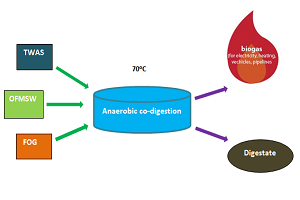
Rania Mona Zeid Alqaralleh
University of Ottawa, Canada
Title: Biogas Recovery from Hyper-thermophilic Anaerobic Co-digestion of Thickened Waste Activated Sludge, Organic Fraction of Municipal Solid Waste and Fat, Oil and Grease
Biography
Biography: Rania Mona Zeid Alqaralleh
Abstract
In the light of climate change, environmental challenges and raising demand on energy, the quest toward developing renewable energy has become an urgent necessity. Renewable energy industries, investments, and related policies have been developed incredibly fast in the recent years [1]. A potential renewable energy source is biogas harvested from different types of organic wastes. Anaerobic digestion (AD) is one of the leading methods applied for generating biogas from organic waste. However, the biogas utilization in wastewater treatment plants (WWTPs) is still limited; for example, in the US less than 10% of the WWTPs produce biogas for beneficial use such as heat and power generation [2]. The WWTPs industry is facing real challenges in deploying the biogas production and utilization, such as; the slow biogas generation rate during the AD process, the low energy content (methane%) of the biogas, and the costs to upgrade the biogas [2,3]. In this study the anaerobic co-digestion of thickened waste activated sludge (TWAS) and the suitable organic wastes will be used to overcome some of the significant economic challenges by improving the AD process, increasing the biogas production with higher methane content, and reducing the final volume of waste. The feasibility of using hyper-thermophilic anaerobic co-digestion of TWAS, organic fraction of municipal solid waste (OFMSW), and fat, oil and grease (FOG) in producing biogas from solid waste will be established. The hyper-thermophilic co-digestion at high temperature (70áµ’C) has the potential to improve the anaerobic degradation of the organic waste mixture [4]. Whereas the use of OFMSW and FOG with the right concentrations will not only improve the C: N ratios in the digestion mixture leading to a significant increase in biogas production, but it also helps in converting these organic waste streams from landfills and that means increasing the lifespan of existing landfills and improving the sustainable development by improving waste to energy conversion.

